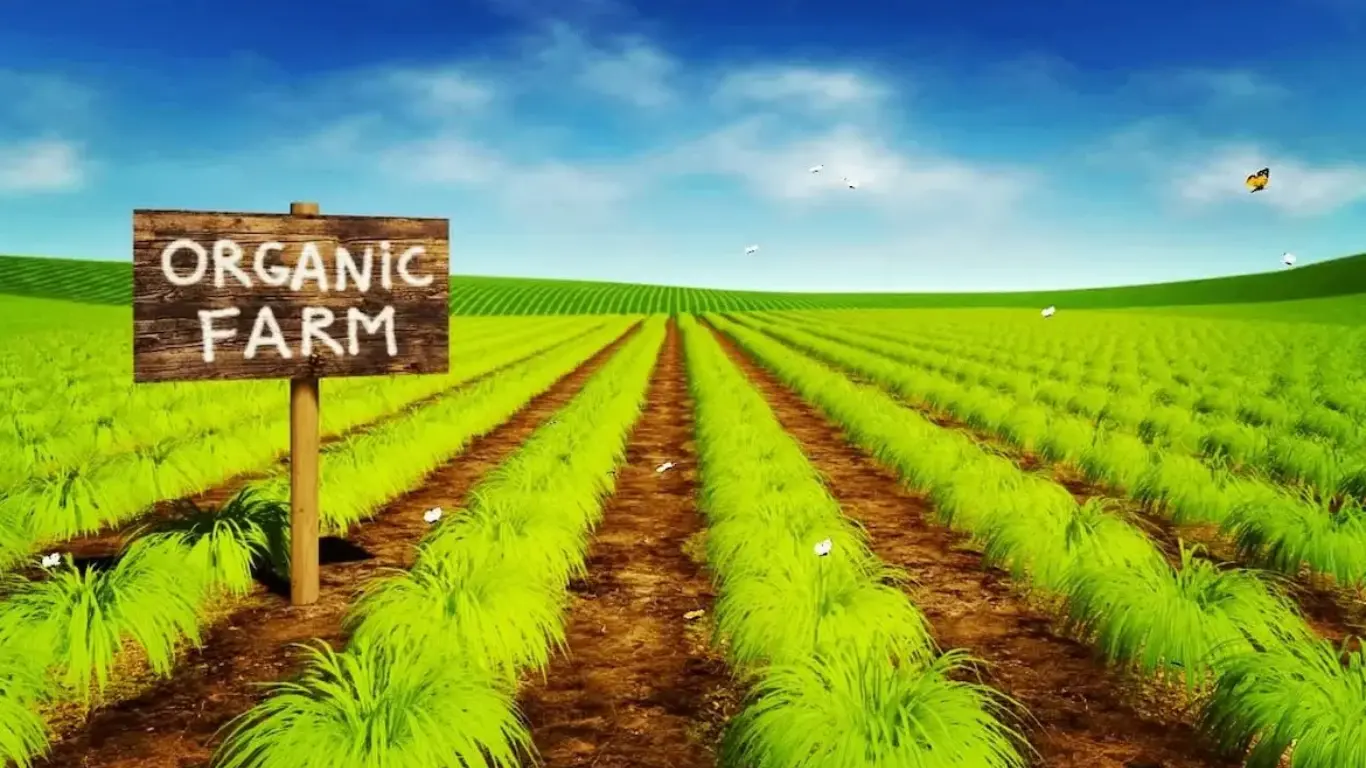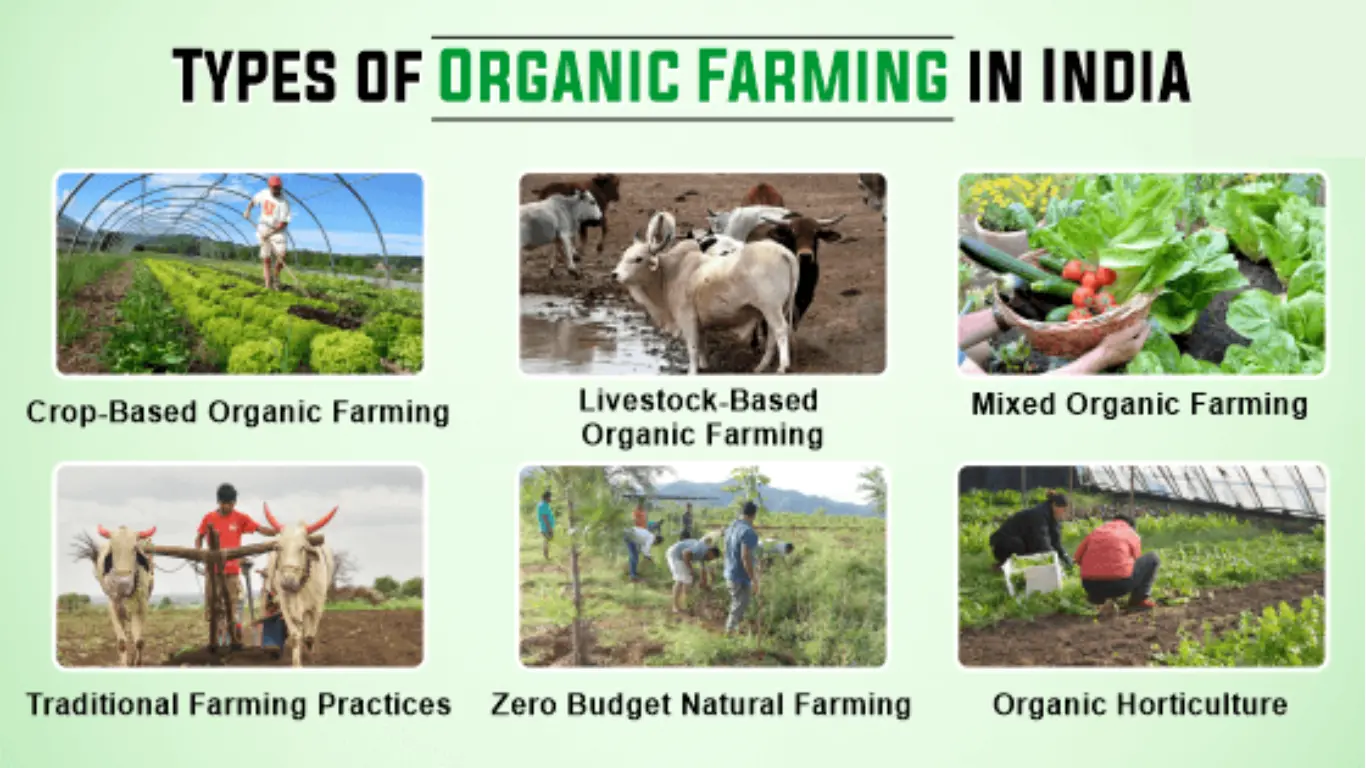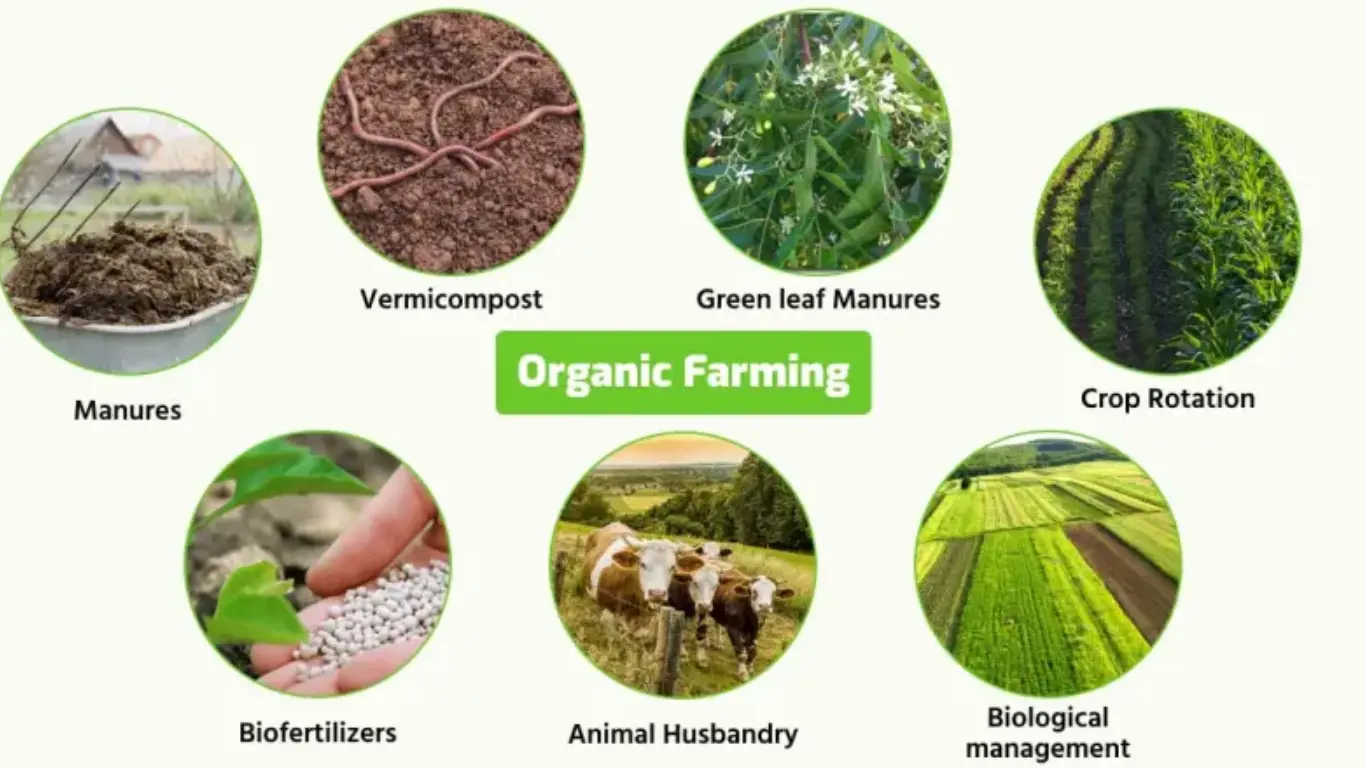Ad
Ad
Organic Farming in India: Types, Methods, Benefits & Challenges Explained

Key Highlights
- Sustainable Agriculture is using natural methods, and avoiding synthetic chemicals and GMOs.
- Diverse Practices include crop-based, livestock-based, and mixed organic farming.
- Environmental and Health Benefits: Improves soil health, enhances biodiversity, and produces chemical-free food.
- Challenges are lower yields, higher costs, and certification hurdles.
In today's rapidly changing world, there's a growing awareness of the impact our choices have on the environment. Among these choices, organic farming stands out as a sustainable and eco-friendly approach to agriculture. It emphasizes natural methods in cultivating crops and raising livestock, avoiding synthetic chemicals and genetically modified organisms (GMOs). In this article, we'll explore organic farming in India, including its types, methods, benefits, and challenges.
What is Organic Farming?
Organic farming is an agricultural system that focuses on maintaining soil health, preserving biodiversity, and protecting ecosystems by minimizing or eliminating the use of synthetic chemicals, GMOs, and artificial additives. Instead, organic farming relies on natural techniques to promote healthy crop growth and livestock care. The core idea is to produce high-quality, chemical-free food while prioritizing the long-term health of the environment.
Also Read: PM Modi Advocates Agricultural Transformation for Global Food Leadership
Types of Organic Farming in India
India's diverse agricultural landscape supports various types of organic farming, each tailored to specific crops, livestock, or regions.

Let's explore some of the key types:
- Crop-Based Organic Farming: - Crop-based organic farming focuses on growing crops using natural fertilizers like compost and manure. Farmers practice crop rotation to enhance soil fertility and use biological pest control methods such as introducing beneficial insects to manage pests.
- Livestock-Based Organic Farming: - Livestock-based organic farming emphasizes on raising the animals in an eco-friendly and humane manner. Livestock are provided with organic feed, and access to open pasture, and are not treated with growth hormones or antibiotics.
- Mixed Organic Farming: - Many Indian farms combine both crop and livestock-based organic methods. This balanced approach creates a sustainable system where crop residues and livestock manure contribute to a closed-loop nutrient cycle, enriching the soil and reducing waste.
- Traditional Farming Practices: - Traditional farming practices in India often align with organic principles. Farmers use cow dung and organic manure to enrich the soil, rotate crops to maintain soil health, and control pests through natural means.
- Zero Budget Natural Farming (ZBNF): - Popularized by Subhash Palekar, ZBNF is a method that relies on minimal external inputs and utilizes farm-sourced materials. It emphasizes using of locally available resources, such as indigenous seeds and natural fertilizers like Jeevamrutha and Bijamrutha.
- Organic Horticulture: - Organic horticulture focuses on growing fruits and vegetables using organic methods. India, being a major producer of horticultural crops, sees significant adoption of organic practices in orchards and gardens, producing chemical-free and healthier produce.
Advantages of Organic Farming
Organic farming offers numerous benefits that contribute to environmental sustainability, human health, and local economies.

Here are some of the key advantages:
1. Environmental Benefits
- Reduced Chemical Usage: Organic farming reduces the usage of synthetic chemicals, helping preserve soil quality and prevent water contamination.
- Enhanced Biodiversity: Organic farms promote biodiversity by providing habitats for various species, contributing to a healthier ecosystem.
- Carbon Sequestration: Healthier soil management practices in organic farming help capture and store carbon, reducing the impact of climate change.
2. Health Benefits
- Chemical-Free Produce: Organic foods are free from synthetic pesticides, herbicides, and GMOs, reducing health risks associated with chemical residues.
- Nutritional Value: Organic produce often contains higher nutritional value due to better soil quality and no chemical additives.
3. Taste and Quality
- Superior Taste: Many people believe that organic produce has a better taste and quality compared to conventionally grown crops, due to the absence of chemical additives.
4. Sustainability
- Long-Term Soil Fertility: Organic farming practices help maintain soil fertility over the long term, ensuring sustainable food production.
- Reduced Reliance on Fossil Fuels: Organic farms typically use less energy-intensive methods, reducing dependence on fossil fuels.
5. Support for Local Economies
- Local Produce: Many organic farms are smaller and local, supporting rural communities by providing fresh, seasonal produce and creating local jobs.
Disadvantages of Organic Farming
While organic farming offers many benefits, it also comes with some challenges that need to be addressed:
- Lower Yields: - Organic farming can result in lower crop yields compared to conventional farming due to the reduced use of synthetic fertilizers and pesticides.
- Higher Costs: - Organic farming often requires more labour and expensive organic inputs, making it more costly for both farmers and consumers.
- Market Price Fluctuations: - Organic produce can be more expensive, and the market is often influenced by price fluctuations, making it harder for farmers to predict their income.
- Pest and Disease Management: - Organic methods for pest and disease control can be less effective, leading to potential crop losses and requiring more expertise and labour.
- Transition Period: - Converting a conventional farm to organic may take several years, during which farmers may face financial challenges due to reduced yields and the costs of certification.
Also Read: Top 10 Most Profitable Farming Ventures in India
Organic Farming Methods
Organic farming in India incorporates various methods and practices that emphasize sustainability, soil health, and natural processes.
Here are some of the key methods used:
1. Zero Budget Natural Farming (ZBNF)
- Jeevamrutha and Bijamrutha: These are natural fertilizers made from cow dung, cow urine, and other farm-sourced materials.
- Mulching: Applying crop residues as mulch helps conserve soil moisture, suppress weeds, and improve soil structure.
- Crop Rotation: Practiced to prevent the buildup of pests and diseases in the soil.
2. Organic Manure and Compost
- Vermicomposting: Earthworms break down organic matter into nutrient-rich compost, improving soil fertility.
- Traditional Manures: Cow dung, poultry litter, and other organic materials are widely used to enhance soil quality.
3. Biofertilizers and Microbial Inoculants
- Biofertilizers: Rhizobium for legumes and mycorrhizal fungi are used to enhance nutrient availability.
- Microbial Inoculants: Trichoderma and Pseudomonas protect plants from diseases and promote growth.
4. Crop Diversity and Polyculture
- Diverse Cropping Systems: Mixed cropping, intercropping, and agroforestry maximize land use and minimize environmental impact.
- Polyculture: Reduces the risk of pests and diseases while enhancing soil fertility and promoting biodiversity.
5. Natural Pest and Disease Management
- Neem-Based Pesticides: Organic farmers use neem-based pesticides and biopesticides to control pests naturally.
- Companion Planting: Plants that repel pests are grown alongside crops to deter pests naturally.
6. Seed Saving and Heirloom Varieties
- Traditional Seeds: Organic farmers save and preserve traditional, heirloom seed varieties, maintaining genetic diversity and adapting to local conditions.
7. Organic Livestock Integration
- Cow-Based Farming: Cow dung and urine are valuable inputs, and indigenous breeds are raised using organic methods.
8. Conservation Agriculture
- Conservation Tillage: Practices like zero tillage reduce soil erosion and improve moisture retention in arid regions.
- Cover Cropping: Essential for maintaining soil health and preventing erosion.
9. Local and Indigenous Knowledge
- Traditional Knowledge: Organic agriculture often draws on traditional and indigenous knowledge passed down through generations.

Challenges of Organic Farming in Indian Agriculture
Organic farming in India faces several challenges that need to be addressed to ensure its success:
- Awareness and Education: - Many farmers lack awareness and training in organic agriculture practices, making it difficult to adopt organic methods.
- Transition Period: - The transition from conventional to organic farming can be financially challenging due to reduced initial yields and the time required for certification.
- Certification Process: - Obtaining organic certification can be official and time-consuming, particularly for smallholder farmers.
- Market Access: - Organic produce often faces challenges in distribution and market access, requiring organized supply chains and consumer awareness.
- Pests and Diseases: - Managing pests and diseases organically can be more labour-intensive and require specialized knowledge.
Also Read: Top 10 Proven Methods to Boost Agricultural Productivity
CMV360 Says
Organic farming in India represents a holistic and sustainable approach to agriculture that resonates with today's growing environmental awareness. By adopting practices rooted in tradition and modern agricultural science, Indian farmers nurture the land through methods like Zero Budget Natural Farming, organic manure, and biofertilizers. These practices prioritize environmental benefits, health, and local economic support, making organic farming a promising choice.
However, challenges such as limited awareness, official certification processes, and market access must be addressed. Successful organic farming in India demands patience, ecological knowledge, and a commitment to safer food production and environmental preservation. By embracing flexibility and sharing knowledge, Indian farmers can ensure a thriving future for organic agriculture, fostering a healthier environment and more prosperous communities. Supporting organic farming in India means endorsing a conscientious and sustainable path toward safer food and a greener planet.
Features & Articles
Thinking of Buying a Second Hand Tractor? Read These Top 10 Important Tips
Explore key tips to inspect the engine, tyres, brakes, and more before buying a second hand tractor in India....
14-Apr-25 08:54 AM
Read Full NewsComprehensive Guide to Tractor Transmission System: Types, Functions, and Future Innovations
Learn about tractor transmission types, components, functions, and selection factors to enhance efficiency, performance, and agricultural productivity....
12-Mar-25 09:14 AM
Read Full NewsModern Tractors and Precision Farming: Transforming Agriculture for Sustainability
Precision farming enhances agriculture by integrating GPS, AI, and modern tractors for sustainable, efficient, and productive farming practices in India....
05-Feb-25 11:57 AM
Read Full NewsTop 10 Tractors Under 30 HP in India 2025: Guide
Top 10 tractors under 30 HP in India offer efficiency, affordability, and power, ideal for small farms with diverse agricultural needs....
03-Feb-25 01:17 PM
Read Full NewsNew Holland 3630 TX Super Plus vs Farmtrac 60 PowerMaxx: Detailed Comparison
Compare New Holland 3630 and Farmtrac 60 tractors by specs, price, and features to find the perfect fit for your farm....
15-Jan-25 12:23 PM
Read Full NewsSwaraj 735 FE Vs Eicher 380 2WD Prima G3: Detailed Comparison
The Swaraj 735 FE and Eicher 380 2WD Prima G3 are reliable, powerful tractors suited for various farming tasks....
14-Jan-25 09:41 AM
Read Full NewsAd
Ad
As featured on:


Registered Office Address
Delente Technologies Pvt. Ltd.
M3M Cosmopolitan, 12th Cosmopolitan,
Golf Course Ext Rd, Sector 66, Gurugram, Haryana
pincode - 122002

























